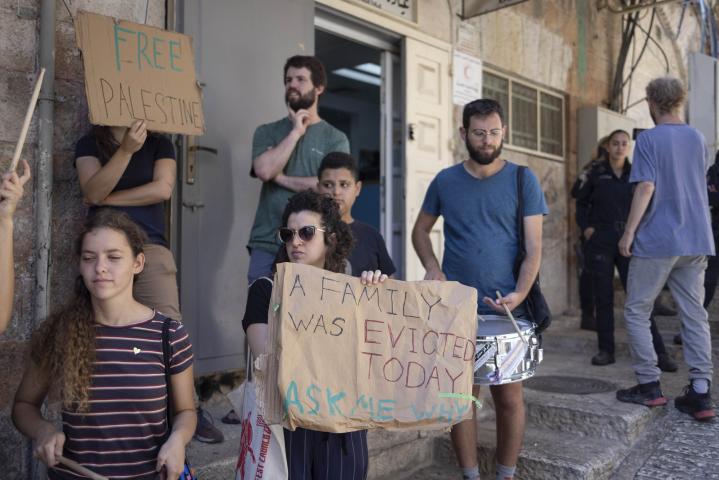
Booking.com accused of laundering profits from Israeli war crimes in Palestine
The role of Booking.com in Israel’s illegal settlements in the Occupied Palestinian Territory.
About the case
- In November 2023, SOMO, along with The European Legal Support Center (ELSC)(opens in new window) , Al-Haq(opens in new window) , and The Rights Forum (TRF)(opens in new window) , filed a criminal complaint with the Dutch Public Prosecutor accusing Booking.com of laundering funds obtained from the commission of war crimes in the Occupied Palestinian Territory (OPT).
- By facilitating the rental of vacation homes on land stolen from the indigenous Palestinian population, Booking.com profits from war crimes.
- The legal basis of this criminal complaint is Dutch anti-money laundering legislation.
- This case is being brought after years of research into Booking.com’s activities in illegal Israeli settlements.
- Our organisations seek action from Dutch law enforcement to effectively end Booking.com’s involvement in war crimes against the Palestinians.
Case rationale: How Booking.com launders proceeds from war crimes
Settlements and war crimes
Israeli settlements across the West Bank are created and maintained through the commission of war crimes against Palestinians and are deemed illegal under international law. The complaint argues that the revenues Booking.com acquires from renting out properties in settlements are proceeds of criminal activities. Based on our research into Booking.com’s corporate structure, ownership, and finances, including revenue and booking fees, we concluded that all their proceeds from Israeli settlements are booked in the Netherlands, thus laundered through the Dutch financial system in violation of Dutch anti-money laundering legislation.

Booking.com: profiting at all costs
Booking.com operates as an online accommodation intermediary, offering a platform for various lodging providers. However, the company includes listings in illegal Israeli settlements. Our research, conducted from March 2021 to May 15, 2023, has unveiled the extent of damage caused by the presence of accommodations in the OPT. Initially, we identified 51 listings on Booking.com, with 19 situated in East Jerusalem and 32 in other parts of the West Bank. Subsequent investigations in July 2022 and May 2023 revealed a concerning increase, with the total number of listings rising to 70, including 13 in East Jerusalem and 57 in other areas of the West Bank.
These listings hide the criminal nature of settlements, a deceptive practice that ignores international law and generates profit from the longstanding human rights violations that have enabled the establishment and ongoing expansion of these settlements.

Israel’s occupation, dispossession and erasure of Palestinians
The Israeli occupation is erasing Palestinians living in the occupied territory. In the West Bank, their homes are demolished, and their lands are taken to make room for illegal settlements.
As previously reported(opens in new window) by Human Rights Watch, the rental properties listed by Booking.com in the settlements are available to guests under conditions of discrimination. Palestinian residents of the West Bank who own the land (seized by Israeli authorities) on which the properties are built cannot stay at those properties, even if they paid for their stay. This is because, lacking a permit, they would be denied entry at a military checkpoint or the security gate at the settlement entrance.

Booking.com’s business operations contribute to a system of segregation that separates the occupied Palestinian population from Israeli settlers, a system that local and international experts conclude (opens in new window) amounts to apartheid. Under that system, Palestinians are denied access to large areas, including their own agricultural lands, across the West Bank. The only way Booking can avoid renting properties in an inherently discriminatory manner is to refrain from listing properties in settlements.
Beyond discrimination, the impacts of Israeli settlements on Palestinian communities in the West Bank are severe and ongoing. Palestinians face physical attacks, destruction of their homes and livelihood, sexual violence and torture at the hands of settlers. These violations have been increasing (opens in new window) and have led to mass forced displacement of entire Palestinian communities in the West Bank.
The case against Booking.com
Allegations
Booking.com is a big player in the online tourism industry. For years, the company has been confronted with its responsibility for contributing to the crimes committed against Palestinians and decided to continue its business in illegal settlements.
This criminal complaint against Booking.com is the culmination of extensive research into the company’s business within the Occupied Palestinian Territory as well as advocacy for Booking.com to stop promoting and enabling rentals in illegal settlements, including by leading human rights organisations like Amnesty International and Human Rights Watch. Research reports have detailed how online tourism platforms, such as Booking.com, have been instrumental in facilitating the criminal Israeli settlement enterprise (see timeline below).
Despite continuous calls(opens in new window) from both Palestinian and international civil society groups for action, Booking.com has systematically disregarded the legal implications of its involvement in illegal Israeli settlements. This indifference has led the United Nations to include the company in a UN database(opens in new window) listing companies that benefit from and contribute to the creation, maintenance and expansion of these illegal settlements.
The legal basis of the case against Booking.com
Based on our research and the extensive work of others, including those referred to above, Booking.com’s business activity in the OPT contributes to and profits from crimes against the Palestinian people. Following this, we conclude that the company also has a case to answer under Dutch financial crimes legislation.
- Israeli settlements in the OPT are widely recognised as a violation of international law and are associated with the commission of multiple war crimes. The illegality of the settlements has also been underlined by the International Court of Justice(opens in new window) and recognised by the Dutch government(opens in new window) .
- Booking profits from those international crimes is illegal according to Dutch criminal law, specifically Article 1 (4) of the Dutch International Crimes Act (Wet Internationale Misdrijven). These proceeds of crime enter the Dutch financial system, which we allege constitutes money laundering.
Unpacking money laundering
The case argues that Booking.com is a blatant example of money laundering, with the company openly advertising and attracting customers to illegal settlements. This illicit money flow is connected to grave human rights violations and possibly war crimes.
- Money laundering is a crime that involves illicit financial flows.
- The profits made and the money laundered are directly tied to severe human rights abuses and war crimes.
- The Netherlands must enforce its laws effectively to prevent complicity in human rights violations and war crimes.
“Civil society actors have confronted Booking.com for years regarding the illicit nature of their profits from Israeli settlements. Nevertheless, they continue to list settlement accommodations on their website. For every booking made in a settlement, they receive a fee; proceeds that enter the Dutch financial system. The Netherlands must enforce its own laws and put a halt to this immediately. ” Lydia van Leeuw, Researcher at SOMO.
Responses by Booking.com
Respected local and international human rights experts have been raising the issues (opens in new window) with the company since at least 2018. These conversations have yielded no results and delivered absolutely nothing to Palestinians, who are continuously losing more land while Booking.com makes a profit from their property.
Booking.com seemed to take a step in the right direction in the summer of 2022 when what appeared to be proposals to add a human rights-related warning label to settlement listings were leaked to international media. However, Israel’s Minister of Tourism responded strongly, and Booking.com appeared to change course. The company added a generic warning label for all listings in the West Bank – including Palestinian accommodations – saying the area “may be considered conflict-affected” by the customer’s government. The label made no mention of the illegality of settlements or human rights concerns.
When asked by SOMO for a response to allegations of money laundering, the company said it wholeheartedly disagreed with the allegations. The company shows no intention of adjusting its approach: “[…] we will permit listings anywhere in the world unless legally prohibited by the domestic laws […].” and claims that there are no laws prohibiting listings in Israeli settlements, and rather that U.S. laws would prohibit them from divesting from Israeli settlements.
Voices of the community

Located west of Bethlehem, Wadi Foukin is a Palestinian village surrounded by illegal settlements from one side and the armistice line from the other side, leaving the village almost completely isolated. In May 2024, Booking.com had several accommodations listed from Neve Daniel, one of the nearby settlements to Wadi Foukin.
“The village is currently surrounded by settlements from all directions. Everything is confiscated, meaning that neither the underground nor the airspace is ours any more. East, West, South and North, there are settlements and accelerated construction… We are totally disconnected from the Palestinian Territories. The total landscape of the village was around 12000 donums, out of which only around 300 donums are left…” Muhammad Mousa Manasra, farmer from Wadi Foukin.
A slideshow with 7 images
The slider is set to loop infinitely.
What do we want?
We want to stop companies from legitimising crimes and occupation.
Booking.com is profiting from the war crimes that led to the establishment of the settlements, as well as the violations of Palestinians’ rights resulting from the settlement enterprise.
The main aim of this complaint is the realisation of corporate criminal accountability for Booking.com. Such accountability can come in the form of a criminal investigation initiated, an indictment issued by the prosecutor, and, ultimately, a conviction by a criminal court. Criminal procedures such as this one can be lengthy and could span multiple years. Booking.com could be fined, and the individuals who are responsible for this conduct could face personal liability. Any of these measures would provide a strong deterrent to companies operating in or planning to operate in illegal Israeli settlements.
Ultimately, we want all companies in Israeli settlements to face accountability for their actions. Anti-money laundering legislation could offer one tool for promoting such accountability.
Case timeline
-
2024May 15Booking.com responds to SOMO’s research findingsupdateAs part of SOMO’s quality guidelines, we gave Booking.com the right to reply to our research findings.Published on:
-
2023Nov 01Complaint filed with the Dutch Public ProsecutorupdateOn the 8th of November of 2023, the complaint was officially filed by the European Legal Support Center (ELSC), Al-Haq, The Rights Forum (TRF) and SOMO.Published on:
-
2022Oct 12Booking.com’s response to stopping OPT listingsupdateBooking Holdings’ and Booking.com respond to the Business and Human Rights Resource Center regarding the issues raised by Human Rights Watch and Al Haq.Published on:
-
2021Mar 04
What’s next?
This case puts Dutch law enforcement at a crossroads. It must decide whether it is willing and able to uphold its own laws and Dutch international legal obligations. The Dutch Prosecutor must now decide whether to proceed with an investigation or prosecution. We believe there is substantial evidence to justify action and will keep this page updated.
SOMO’s role
SOMO investigated Booking.com’s corporate structure, ownership, and finances and contributed to developing the anti-money laundering framework as it applies to Booking.com’s activities in the context of the Israeli settlements.
Company responses
- Booking.com’s response to SOMO’s research findings (15 May 2024)
Related publications

Do you need more information?
-

Lydia de Leeuw
Researcher
Partners
Related news
-
 The hidden human costs linked to global supply chains in ChinaPosted in category:News
The hidden human costs linked to global supply chains in ChinaPosted in category:News Joshua RosenzweigPublished on:
Joshua RosenzweigPublished on: -
Powering injustice Published on:
 Lydia de LeeuwPosted in category:Publication
Lydia de LeeuwPosted in category:Publication Lydia de Leeuw
Lydia de Leeuw
-
 Major brands sourcing from China lack public policies on responsible exitPosted in category:News
Major brands sourcing from China lack public policies on responsible exitPosted in category:News Joshua RosenzweigPublished on:
Joshua RosenzweigPublished on:








